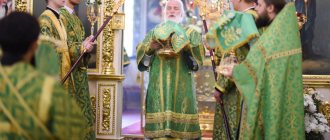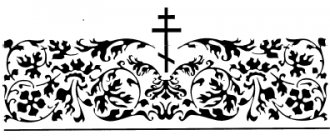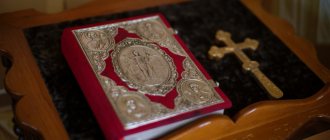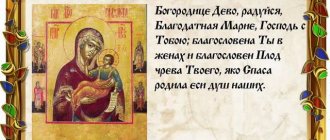What happens to the soul after death
After death, a person’s life does not end, at least for the soul. While the body cools down, natural tissue decay processes develop in it, and the imperishable shell begins its journey in a new form. She must soon leave the earth and appear before the throne of the Lord. This happens on the 3rd day after death.
Then the funeral is held, and after the shower one goes to heaven for a brief “acquaintance” with this monastery.
After 6 days, she will go to hell for the same purpose, but the meaning is different: to see the suffering of sinners, and also to begin her path of overcoming trials - ordeals. After 30 days, the Lord awaits the soul of the deceased before His throne. Then the Private Judgment begins - a small version of the Last Judgment, which will one day come for everyone. During the period of testing, the sins of the deceased person committed during his lifetime are listed, which determines where his soul will go: to hell, heaven.
The meaning of prayer for the repose of the soul of the deceased
The soul continues to exist, and therefore relatives can find a way to interact with it. The simplest and most accessible, as well as effective, method is to read prayers, or even better, to perform ceremonies in church or at home. At the same time, the soul feels that they are caring for it: they ask the Lord to make the path easier, forgiveness of sins, protection and mercy.
Relatives who loved the deceased person turn to God with such demands.
The Almighty Father fulfills the prayers of those who turn to him sincerely through prayer. This leads to an improvement in the position of the imperishable shell in the other world. In some cases, she even goes to heaven, despite the sins committed during life - they are forgiven thanks to the prayers of loved ones. If you don’t pray for the soul of the deceased, it will be hard for it - it will be extremely difficult to overcome the ordeal without support, because in another world there is no longer an opportunity to repent or atone for sins.
Reading prayers
Prayer as acceptance of death for relatives
It is not only the incorruptible shell of the deceased who has difficulty in the transition to eternity from worldly life. His relatives also suffer and are tormented by the loss of a loved one. Almost always they cannot accept death as a way for a loved one to leave their life forever. Prayer and worship also help with this. Getting closer to the Lord allows you to soften the blow and fill the emptiness in your soul. This is how a gradual acceptance of the fact of the loss of a loved one occurs. This is facilitated by prayer and the observance of a memorial service.
The bitterness of loss may persist for a long time, but the negative perception of a person’s death goes away.
About the rites following the burial of an Orthodox Christian
The remains of the deceased were buried in the earth, where they will rest until the end of time and the general resurrection. But the love of the Mother Church for her brainchild, who has departed from this life, does not dry out. Like a loving mother, on certain days the Church prays for a deceased Christian and offers the most holy Bloodless Sacrifice for his repose. These days of special prayers for the deceased are the following: the third, ninth, fortieth and annual after his death (counting the day of death itself).
The commemoration of the deceased these days is sanctified by the ancient custom of the Christian Church.
The Christian Church commemorates the deceased on the third day after his death in honor of the three-day resurrection of Jesus Christ and in the image of the Holy Trinity.
Next, the Christian Church commemorates the dead on the ninth day after their death in honor of the nine ranks of angels, who, as servants of the King of Heaven and representatives to Him for us, petition for mercy for the deceased. The commemoration of the newly deceased on the fortieth day after his death, according to the tradition of the apostles, is based on the forty-day mourning of the Israelis about the death of Moses. In addition, it is known that the forty-day period is very significant in the history and tradition of the Church as the time necessary for preparation, for accepting a special divine gift, for receiving the gracious help of the Heavenly Father. Thus, the prophet Moses was honored to talk with God on Mount Sinai and receive the tablets of the Law from Him only after a forty-day fast. The prophet Elijah reached Mount Horeb after forty days. The Israelites reached the promised land forty years later, after forty years of wandering in the desert. Our Lord Jesus Christ Himself ascended into heaven on the fortieth day after His Resurrection. Taking all this as a basis. The Christian Church established the commemoration of the departed on the fortieth day after their death, so that the soul of the deceased would ascend the holy mountain of heavenly Sinai, be rewarded with the sight of God, achieve the bliss promised to it and settle in the heavenly villages with the righteous. The Church commemorates the deceased on the anniversary of their death. The basis for this establishment is obvious. It is known that the largest liturgical cycle is the annual circle, after which all the fixed holidays are repeated again. The anniversary of the death of a loved one is always marked with at least a heartfelt remembrance by loving family and friends. For an Orthodox believer, this is a birthday for a new, eternal life.
Church tradition preaches to us from the words of holy ascetics of faith and piety, who were honored to receive divine revelation, about the mystery of testing the soul after its departure from the body. For the first two days, as legend tells, the soul of the deceased remains on earth and, with an accompanying angel, walks through those places that attract it with memories of earthly joys and sorrows, good deeds and evil. This is how the soul spends the first two days, but on the third day the Lord, in the image of His three-day Resurrection, commands the soul to ascend to heaven to worship Him - the God of all. How timely on this day is the church commemoration of the soul of the deceased, who appeared before the Face of the Just. Then the soul, as if on its way back from the Face of God, accompanied by angels, enters the heavenly abodes and contemplates their indescribable beauty. The soul remains in this state for six days - from the third to the ninth. On the ninth day, the Lord commands the angels to again present the soul to Him for worship. The soul stands before the Throne of the Most High with fear and trembling. But even at this time, the Holy Church again prays for the deceased, asking the merciful Judge to place the soul of her departed son with the saints. After the second worship of the Lord, the angels take the soul to hell, and it contemplates the cruel torment of unrepentant sinners. On the fortieth day after death, the soul ascends for the third time to the Throne of the All-Good. Now her fate is being decided - she is assigned a certain place, which she has been awarded due to her deeds.
The everlasting psalter
The indefatigable Psalter is read not only about health, but also about peace. Since ancient times, ordering a commemoration on the Everlasting Psalter has been considered a great alms for a departed soul.
It is also good to order the Indestructible Psalter for yourself; you will feel the support. And one more important point, but far from the least important, there is eternal remembrance on the Undying Psalter. It seems expensive, but the result is more than millions of times more than the money spent. If this is still not possible, then you can order for a shorter period. It's also good to read for yourself.
Order from the monastery in Jerusalem
That is why church prayers and commemorations on this day are so timely. They atone for the sins of the deceased and ask for his soul to be placed in paradise with the saints. On these days, memorial services and litias are celebrated. In addition to these days, the Church has established special days for the solemn, general, ecumenical commemoration of all the dead. These days are: Meat Saturday, Saturdays of the second, third and fourth weeks of Great Lent, Tuesday of St. Thomas Week, Saturday before the day of Holy Pentecost. In addition, in Russia it is established to remember “Orthodox soldiers who laid down their lives on the battlefield for their faith and fatherland” on the Saturday before the day of the Great Martyr Demetrius of Thessaloniki (before October 26) and on August 29, the day of the Beheading of John the Baptist. On the first day of Easter and on the day of the Nativity of Christ, a memorial service and burial in the church before and after the liturgy are not performed until the evening. The commemoration of the dead at the liturgy on the holidays of Easter, the Nativity of Christ and other major holidays, as well as on Sundays, should be performed only at the proskomedia and after the consecration of the Holy Gifts during the singing of “It is worthy to eat”, and a special funeral litany “for the sake of the festive celebration” on these days are not supposed to be pronounced (Typikon, ch. 59, 169, etc. Nomocanon at the Trebnik). But if on Sundays an early liturgy for the repose is served, and the funeral Apostle, Gospel, prokeimenon and sacrament are also included, then there is a funeral litany and commemoration of the dead.
During the first week of Great Lent, Holy and Easter weeks, as well as on the weekdays of Holy Pentecost, requiem services are not celebrated in the church. (Commemoration of the deceased is assigned to Saturdays of the 2nd, 3rd and 4th weeks of Great Lent.) If the 3rd or 9th day after death occurs on the weekdays of Great Lent, then the memorial service for the newly deceased is served on the day closest to these days funeral Saturday. Only on the 40th day, no matter which day it falls on, is a memorial service held in the temple.
“Sorokoust” does not occur during Lent or Easter, but begins on the week of the Apostle Thomas and continues until the completion of 40 days. At burial and on the 40th day of death during the weekdays of Great Lent, it is permitted to celebrate the Liturgy of the Presanctified Gifts with the addition of the funeral Apostle, the Gospel and the litany.
Restrictions for performing a memorial service in a church
For some categories of people, a number of prohibitions have been created that do not allow full-fledged church ceremonies. This is due to the fact that during their lifetime they never came to God, they neglected him, showing unbelief, disrespect, and refusing to serve him. Church rituals, including the rite of requiem in Church Slavonic, are not performed in a number of cases:
- Gentiles: people of other faiths visit their churches, where they pray, make donations, and accordingly, the main rituals are performed over them there;
- unbaptized: children and adults do not always renounce God if, for various reasons, they do not partake in the sacrament of baptism, but even believers who have not undergone this rite cannot be considered full members of the church, which means that the attitude towards them will be the same as and to non-believers (funeral services are not held, church rites are not performed);
- baptized atheists: the opposite situation also happens, when a person who at one time joined the church through the sacrament of baptism later renounced God (for various reasons he became an atheist, at best he does not believe, and at worst he became an atheist), such people are prohibited perform a funeral service, as well as conduct a memorial service for the laity;
- unbaptized suicide: suicide is rightfully recognized as the most serious sin, people who decide to kill themselves can no longer get closer to God, they are deprived of the right to a funeral service, like the others listed above, you cannot read traditional prayers for them, therefore it is prohibited home funeral service for the deceased.
Memorial service in the temple
Troparion, tone 5
Chorus:
Blessed are You, Lord, teach me by Your justification.
You will find the face of the saints, the source of life, and the door of heaven, that I may also find the path of repentance. Lost sheep I am, call to me, O Savior, and save me.
Blessed are You, Lord, teach me by Your justification.
Having preached the Lamb of God, and slain the one who was like the lambs, and to life ageless, holy, and everlasting, He diligently, martyr, pray to grant us permission for debts.
Blessed are You, Lord, teach me by Your justification.
You who have walked the narrow and sorrowful path, who have taken the cross in your life as if you had taken it with a yoke, and who have followed Me by faith, come and enjoy what is in store for you with honors and heavenly crowns.
Blessed are You, Lord, teach me by Your justification.
I am an image of Your ineffable glory, even as I bear the plagues of sins; Be generous to Your creation, Master, and cleanse with Your compassion, and grant me the desired fatherland, creating me a paradise dweller.
Blessed are You, Lord, teach me by Your justification.
Of old you created me from those who do not exist, and in Your Divine image, by breaking the commandment, you returned me to the earth from which I was taken, in the likeness of which you built me, with ancient kindness itisya.
Blessed are You, Lord, teach me by Your justification.
Give rest, O God, to Thy servant (Thy handmaid, Thy servants) and make him (I, I) in Paradise, where the faces of the saints, O Lord, and the righteous women shine like lights; Rest Your departed servant (Your departed servant, Your departed servant) to rest, despising all his (her, their) sins.
Glory: We piously sing the Tri-radiant One of the One Divinity, crying out: Holy art Thou, Father without beginning, co-external with the Son, and Divine Soul, enlighten us with the faith of those who serve You, and consume the eternal fire.
And now: Theotokos:
Rejoice, Pure One, who gave birth to God in flesh for the salvation of all, through whom the human race will find salvation, may we find paradise through You, pure blessed Mother of God.
Alleluia, alleluia, alleluia, glory to you, God. ( Thrice
)
Lord have mercy ( 40 times
).
Remember, O Lord our God, in faith and hope the life of your eternal departed servant (your departed servant, your departed servants) ( their names
), and as he is good and a lover of mankind, forgiving sins and consuming untruths, weaken, forsake and forgive all his (her, their) sins, voluntary and involuntary, restoring him (her, them) to Your holy second coming in communion Your eternal blessings, and For the sake of You who is the only believer, the true God and the Lover of mankind, for You are the resurrection and life and rest for Your servant (Your servant, Your servant) (
their names
), Christ our God, and to You be the glory We send, with Your beginningless Father, and with By the Most Holy Spirit, now and ever and unto ages of ages, amen.
Venue and order of service
The secular rite of observance (for the laity) is carried out in any other place, mainly at home. This does not require the participation of a priest. The exception is the liturgy. Only this service cannot be performed by the laity. The custom of holding a lay rite of following a requiem service dates back to ancient times, when monks rarely took orders.
Ceremony in the temple
The duration of the service performed by the clergyman is 20-30 minutes. At the same time, readers periodically enter. In the church, the rite of requiem is performed before the eve. Here (according to the Trebnik) a dish with kutia is placed, but today this rule has lost its relevance. The service begins in the morning (8-9 hours, depending on the church). The texts, according to rite, are pronounced solemnly and loudly. The clergyman also lists the names of the deceased in the notes of relatives.
Orthodox Church
How to learn to read prayers in church and at home
When reading prayer texts, the clergyman uses special techniques so that the words sound loud enough and clearly, at the same time the text is pronounced in a chant, without long pauses, since the funeral service is performed over a short period. It is not necessary to repeat all the details of singing exactly as the readers do in the choir; the main thing is to learn the basic subtleties:
- appropriate mood: the rite of requiem is performed when there is grace in the soul, this will allow it to be transmitted to the soul of the deceased, to receive mercy from the Almighty; if there are mixed feelings in the soul (pain, anger, hopelessness), one should pray for the granting of relief, and then try to read the prayers again ;
- rhythm: you need to take into account that singing is performed in the temple, which means there must be a certain rhythm - this is a characteristic feature of the prayers said by the priests;
- voice: the text should be read loudly, as is done in church, and at home (when pronouncing sacred words in private) the prayer is sung calmly, and it should be read completely differently if relatives and friends have gathered, for example, at a church holiday in a home environment, then you need pronounce the text so that it can be heard throughout the room, there are several voices (2, 4, 5, 6, 8), each helps to express a certain emotion;
- chant: the rite of requiem is a special service, it should be sung in Church Slavonic, which complicates the pronunciation of prayers, but one should also take into account the need to read them in a chant, the words are easier to pronounce in this way;
- the correct name of the deceased: you should pray for the deceased, calling him by the name recorded in the baptismal certificate; during a secular funeral service this will not be difficult, just look at the documents of the deceased;
- differences between the Church Slavonic language: previously, colloquial speech was understood better by different peoples, because the differences between the Slavic languages were small, but today the difference is significant, words have different meanings, even if during pronunciation you can intuitively guess the correct pronunciation, it will be difficult to understand the true meaning what has been said, therefore it is important to memorize the text or clarify incomprehensible points with the priest, local theologians, another difference in the church language is the absence of the letter e;
- nuances of the text: even if the meaning of a home memorial service for the deceased is unclear, you need to understand how to read the prayers, learn to decipher abbreviations, for example, what should be done when the Trisagion is encountered (Holy God, Holy Mighty, Holy Immortal, have mercy on us), or an indication is given of the frequency of pronouncing certain words (Lord, have mercy - three times), etc.
When reading at home, inaccuracies in the pronunciation of words are acceptable (emphases are placed incorrectly), but people who are churchgoers, as well as those related to the church, know the Church Slavonic language, and therefore understand the rules for pronouncing individual words. You should prepare to read the text before pronouncing unfamiliar words.
Reading prayers in the temple
Funeral services by the laity
There are several options for reading prayers. The difference lies in where the prayer service will be held.
Brief litany at home or at the grave
A memorial service, which is held independently at home, is called litia in the liturgical books. It is an abbreviated version of the service for reading by the laity. Contains basic prayers, but not all of those included in the traditional ritual.
Brief version of the secular funeral service
The secular version of the service is also presented even shorter, as in the case of a memorial service. The number of prayer texts is smaller, but the most significant of them remain. This allows you to read everything that is written in the shortest possible time.
Requiem service with secular rites. Download text with accents
It is carried out when, for various reasons, there is no clergyman nearby, but it is necessary to read the prayer. In the temple, the altar is closed before reading. Features of the service:
- the exclamations of the clergy, unusual for the ear, can be replaced with a short prayer: “Through the prayers of our holy fathers, Lord Jesus our God, have mercy on us, Amen”;
- lay people read texts from the lectern, not from the altar and not even from the pulpit;
- other exclamations (alleluaries, prokeemny, “Lord have mercy”, etc.) can be skipped;
- It is permissible to use only a hand censer;
- the reader should not wear the attire of a clergyman.
https://www.youtube.com/watch?v=WBVBHpCa82s
When can a secular requiem be read?
A memorial service is a service for the deceased. Accordingly, prayer words are said on certain days. If you plan to read a memorial service for the deceased, the text for the laity can be found in the Trebnik, a prayer book.
Prayers up to 40 days after death
The soul of the deceased especially needs help after the death of the body. You can turn to the Lord in different ways: visit a temple, read prayers yourself, or perform a short secular rite of requiem. In the period up to the 40th day, the soul goes through ordeals, and therefore any help will be important.
Traditional days of remembrance of the dead
In addition to private days of remembrance (3, 9, 40 after death), a memorial service can be considered for reading by the laity at home and in the cemetery on certain days - general memorial days. They were established by the Orthodox Church taking into account the meaning of the date:
- Parental Saturdays: Ecumenical Meat Saturday, Saturday of the 2nd, 3rd, 4th weeks of Great Lent, Trinity, Dimitrievskaya;
- Radonitsa - occurs on the first Tuesday after Easter, is considered a universal day of remembrance, therefore, like other dates established by the Church, it is suitable for holding a secular memorial service.
Calculator for counting the days of the deceased's funeral
Akathist for the departed
Voice 8th
Verse 1:
Alleluia, alleluia, alleluia.
Chorus:
Alleluia, alleluia, alleluia.
Verse 2:
Blessed is he whom you have chosen and accepted, O Lord
(or:
Blessed is the one you have chosen and accepted, Lord,
or:
Blessed, I have chosen and accepted you, Lord).
Chorus:
Alleluia, alleluia, alleluia.
Verse 3:
His (her, their) memory endures forever.
Chorus:
Alleluia, alleluia, alleluia.
Verse 4:
His (her) soul will settle in good things
(or:
Their souls will settle in good things).
Chorus:
Alleluia, alleluia, alleluia.
The order of singing the rite by a layman at home
It is important not just to pronounce the sacred words, but also to understand the prayers being read. If possible, you should avoid mistakes and the use of incorrect accents. The established procedure for holding a memorial service for the deceased must not be violated; the text in church and at home differs in the combination of prayers. The mundane version is much shorter.
Reading the "usual beginning"
When comparing a memorial service for the deceased, the text in the church and at home may differ (the full and shortened version is used), but the introduction is the same. Called the usual beginning, it is a combination of short prayer texts, including the Trisagion, “Lord, have mercy,” “Our Father,” as well as words of praise to the Heavenly Father. Read sequentially.
Reading Psalm 90 after 3 bows
The prayer “Alive in the help of the Lord” is said after worshiping the Lord three times. It is read when a person needs to strengthen hope and gain strength. The person praying trusts in God, relies on his will, asks for help and protection.
Lay worship
Singing troparia and 17th kathisma
When reading the troparion (including the Theotokos), voice 8 is chosen. The one who sings prayers in this way expresses hope for the speedy onset of bliss of the soul in unity with God. When reading the kathisma, a readiness is shown to take the true path (corrections), to carry the word of God, voices a request to open the eyes of the person (praying) in order to behold the miracles performed by the Lord, makes a promise to live according to His laws.
Saying “Lord, have mercy” 40 times
They pray for the possibility of the Almighty Father remembering all the dead, for the forgiveness of sins. They give a promise of recognition of God as one. The troparia are pronounced, choosing voice 5 - this is a melody that allows you to strengthen repentance and also gives peace to the soul. Then they say sedalen (including the Theotokos).
Penitential Psalm 50
When reading Psalm 50, they ask the Lord for forgiveness for sins, cleansing the soul from the consequences of lawlessness committed by man. They hope to give joy to the heart.
Canon about the deceased, singing “Eternal Memory” and reading the Trisagion prayer
They read the canon (they sing the songs included in the composition repeatedly). During the traditional celebration of a memorial service, this function is performed by the choir in the choir. Then sedalen, ikos, kontakion (different songs) are sung in turn. The funeral lithium is performed last. Considering that the resulting service is quite voluminous, it is better to print out the free downloaded prayers. If you plan to frequently perform memorial services in everyday life, the text should be purchased in book format (Prayer Book or Breviary Book). It is repeated when the need of the soul arises on special days.
Reading the Psalter
Signs during a memorial service
Beliefs in omens and other superstitions are a sin, because this has nothing to do with the Orthodox faith. Over the centuries of performing the rite of remembrance, various folk traditions have formed. Many of them are unfounded and arose out of fears and lack of knowledge about the processes that happen to a person after death. Today this veil has been lifted somewhat, people have received more information, so the righteous fear of the inexplicable has already disappeared. But still some traditions and erroneous judgments have been preserved:
- closed mirrors: it is generally accepted that reflective surfaces can cause many troubles, first of all, the soul of the deceased will certainly be reflected in them, in addition, it can get lost in the labyrinths of the afterlife, not find peace, and finally, fears are expressed that evil ones come from the mirrors entities will bother the living (hence the appearance of knocks, creaks, and groans at home);
- extinguished church candles: the fire must burn during the rite of requiem, it is generally accepted that if the flame goes out, this is a bad sign, in fact this happens due to drafts and due to the poor quality of the candle.
There is only one known case when a miracle occurred during the ceremony - the flame ignited by itself. This happened when a funeral service was held for St. Peter, Metropolitan of Moscow (XIV century). Later, this candle helped to perform a miracle - to restore sight to a blind woman (the wife of a Mongol khan).
Candle for the repose of the soul of the deceased
“Question-answer” section
Is it possible to hold a memorial service at home for a suicide or an unbaptized child?
Expert opinion
Father Pavel
Clergyman
A memorial service, regardless of its duration or content, cannot be held for suicides, unbaptized people, or atheists. Traditional prayers are not read over such people, because they have abandoned God for various reasons. During burial, they do not use ritual paraphernalia, and do not perform services in church or at home. There is a special rite that alleviates the suffering of loved ones who cannot pray for the deceased - “the rite of prayerful consolation of relatives who have died without permission.”
What happens if you make a mistake in the order of reading the secular rite of a memorial service?
Expert opinion
Father Pavel
Clergyman
A layman who says the prayers that make up the secular rite of a memorial service is not a clergyman (he has not been ordained). This means that inaccuracies and some inconsistencies in the pronunciation of words in Church Slavonic, errors in the placement of stresses are not critical. But you should still be careful, try not to swap parts of the funeral service, and pronounce the sacred texts as accurately as possible.
Cross and candles in the church
Do relatives need to attend the funeral service for the deceased in the church?
Expert opinion
Father Pavel
Clergyman
Attendance at the service, which is held to commemorate the deceased, is not obligatory for relatives. However, this is the preferred action to provide more meaningful assistance to the deceased. You can listen to prayers read by the priest, or quietly pronounce the words of sacred texts if they are already familiar. In this case, the participation of loved ones is important.
What is sung at the funeral service?
Expert opinion
Father Pavel
Clergyman
Usually, believers in the temple sing along with the choir at the stage when they say “Eternal Memory”. “Immaculate”, troparion, kontakion are also chanted. When performing a funeral service at home, it is not always possible to maintain exactly the order of the chants, but you should try.
How to read a memorial service for the deceased at home?
Expert opinion
Father Pavel
Clergyman
There are generally accepted rules for performing the rites of commemoration. In the temple, as at home, the sacred text is read in front of a candle flame. You can light a lamp if you have one at hand. This is a symbol of eternity, peace. But the absence of a candle does not mean that you cannot say prayers for the deceased. It must be remembered that this is only one of the conditions for performing the ritual. A candle does not replace helping the soul of the deceased. Without prayer it has no power. It is important to recite the text of the memorial service in front of the icons. At home there should be an image of Jesus Christ, the Mother of God. But today, not everyone has a red corner as before, so if the need arises, you can read prayers alone. Silence and peace will allow you to achieve the desired state of mind. This will allow you to get closer to God in order to convey your prayer.
Reading the Psalter for the Dead
In the Orthodox Church there is a pious custom of reading the Psalter for the deceased both before burial and in memory of him after burial. This custom has existed since ancient times and is based on the fact that the Holy Scriptures, both the Old (to which the Psalter refers) and the New Testaments, being the word of God, have prayer power. Saint Athanasius of Alexandria wrote that the book of psalms is a mirror in which the sinful human soul with all its passions, sins, iniquities, and ailments is not only reflected in its present form, but also finds healing in the psalms. The book of psalms is not a work of art that has come to us from the depths of centuries, although beautiful, but alien and extraneous, no, the book of psalms is very close to us, it is a book about all of us and about every person. “In my opinion,” wrote St. Athanasius, - in the book of psalms, the whole human life and mental dispositions and movements of thoughts are measured and described in words, and beyond what is depicted in it nothing more can be found in a person. Is repentance and confession necessary, has anyone suffered sorrow and temptation, is someone persecuted or has been delivered from misadventures, has he become saddened and confused and is enduring something similar to what was said above, or does he see himself prospering while the enemy is brought into inaction, or does he intend to praise, to give thanks and bless the Lord - for all this there is instruction in the divine psalms... Therefore, even now, everyone, pronouncing the psalms, let him be sure that God will hear those who ask with the psalm word.” Reading the psalter for the departed undoubtedly brings them great consolation - both in itself, as reading the word of God and as a testimony of the love for them and the memory of their living brethren. It also brings them great benefit, since it is accepted by God as a pleasant propitiatory sacrifice to cleanse the sins of those remembered: just as He accepts in general any prayer, any good deed. There is a custom to ask clergy or people specially involved in this to read the psalter in memory of the departed, and this request is combined with giving alms for those remembered. But it is very important for those who remember to read the Psalter themselves. For those commemorated, this will be even more comforting, since it testifies to the great degree of love and zeal for them by their living brethren, who themselves personally want to work in their memory, and not replace themselves in work with others. The Lord will accept the feat of reading not only as a sacrifice for those remembered, but also as a sacrifice for those who bring it, who work in reading. And, finally, those who read the psalter themselves will receive from the word of God both great edification and great consolation, which they are deprived of by entrusting this good work to others and most often not being present at it themselves. But alms can and should be given independently, regardless of the reading of the psalter, and its value in this latter case will, of course, be higher, since it will not be combined with the imposition of obligatory labor on the recipient, but will be given freely according to the commandment of the Savior, and therefore will accepted by the Lord as special alms. Over the deceased bishop and priest, it is not the psalter that is read, but the Gospel, since in their ministry they were preachers of the Gospel word. Only the clergy read the Gospel over them.
The everlasting psalter
The indefatigable Psalter is read not only about health, but also about peace. Since ancient times, ordering a commemoration on the Everlasting Psalter has been considered a great alms for a departed soul.
It is also good to order the Indestructible Psalter for yourself; you will feel the support. And one more important point, but far from the least important, there is eternal remembrance on the Undying Psalter. It seems expensive, but the result is more than millions of times more than the money spent. If this is still not possible, then you can order for a shorter period. It's also good to read for yourself.
Order from the monastery in Jerusalem
Priest's comment
Father Vladimir
Clergyman
When pronouncing prayer texts, you do not need to turn on music. It is enough to create a red corner of the house: put icons, light a candle. Different traditions practice a combination of a memorial service, bagpipes, and text - prayers are read to the tune of a melody that creates the necessary mood. Orthodox Russian believers have different rituals. For example, the choir in the choir, not the musical accompaniment, contributes to the appearance of a certain mood. But today music, one way or another, is gradually becoming part of Orthodox traditions. You can pay attention to the burial ceremony - recently the procession has been accompanied by an orchestra, which is perceived by many as a matter of course, a natural condition for holding a funeral according to Christian customs. But this is not so, the tradition appeared in the last century.











